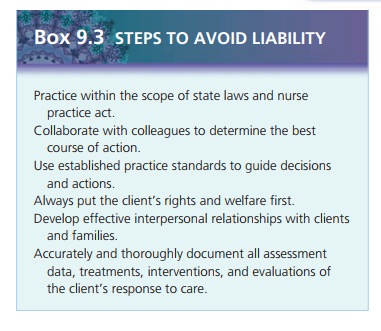Chapter: Psychiatric Mental Health Nursing : Legal and Ethical Issues
Nursing Liability
Nursing Liability
Nurses are responsible for providing safe, competent, legal, and
ethical care to clients and families. Professional guide-lines such as the
American Nurses Association’s (ANA’s) Code
of Ethics for Nurses with Interpretive Statements (2001) and the ANA’s Psychiatric–Mental Health Nursing: Scope and Standards of Practice (2007) outline the nurse’s responsi-bilities
and provide guidance . Nurses are expected to meet standards of care, meaning the care they provide to clients meets
set expectations and is what any nurse in a similar situation would do.
Standards of care are developed from professional standards (cited earlier in
this paragraph), state nurse practice acts, federal agency regula-tions, agency
policies and procedures, job descriptions, and civil and criminal laws.
Torts
A tort is a wrongful act
that results in injury, loss, or dam-age. Torts may be either unintentional or
intentional.
Unintentional Torts: Negligence and
Malpractice. Negligence is an unintentional tort that involves causing
harm by failing to do what a reasonable and prudent person would do in similar
circumstances. Malpractice is a type
of neg-ligence that refers specifically to professionals such as nurses and
physicians (Springhouse, 2004). Clients or families can file malpractice
lawsuits in any case of in-jury, loss, or death. For a malpractice suit to be
successful, that is, for the nurse, physician, or hospital or agency to be![]()
![]() liable, the client or family needs to prove the
following four elements:
liable, the client or family needs to prove the
following four elements:
1. Duty: A legally recognized relationship (i.e., physician to client, nurse to client) existed.
The nurse had a duty to the client, meaning that the nurse was acting in the
capacity of a nurse.
2. Breach of duty: The nurse (or physician) failed to conform to standards of care, thereby breaching or failing the
existing duty. The nurse did not act as a rea-sonable, prudent nurse would have
acted in similar circumstances.
3. Injury or damage: The client suffered some type of loss, damage, or injury.
4. Causation: The breach of duty was the direct cause of the loss, damage, or injury. In other words, the loss, damage, or
injury would not have occurred if the nurse had acted in a reasonable, prudent
manner.
Not all injury or harm to a client can be prevented, nor do all
client injuries result from malpractice. The issues are whether or not the
client’s actions were predictable or fore-seeable (and, therefore, preventable)
and whether or not the nurse carried out appropriate assessment,
interven-tions, and evaluation that met the standards of care. In the mental
health setting, lawsuits most often are related to suicide and suicide
attempts. Other areas of concern include clients harming others (staff, family,
or other cli-ents), sexual assault, and medication errors.
Intentional Torts. Psychiatric nurses also may
be liable for intentional torts or voluntary acts that
result in harm to the client. Examples include assault, battery, and false
imprisonment.
Assault involves any action that
causes a person to fear being
touched in a way that is offensive, insulting, or physically injurious without
consent or authority. Exam-ples include making threats to restrain the client
to give him or her an injection for failure to cooperate. Battery involves harmful or unwarranted contact with a client;
actual harm or injury may or may not have occurred. Examples include touching a
client without consent or unnecessarily restraining a client. False imprisonment is defined as the
unjustifiable detention of a client such as the inappropriate use of restraint
or seclusion.
Proving liability for an intentional tort involves three elements
(Springhouse, 2004):
·
The act was willful and voluntary on the part of the defendant
(nurse).
·
The nurse intended to bring about consequences or injury to the
person (client).
·
The act was a substantial factor in causing injury or consequences.
Prevention of Liability
Nurses can minimize the risk for lawsuits through safe, competent
nursing care and descriptive, accurate documentation.

Related Topics